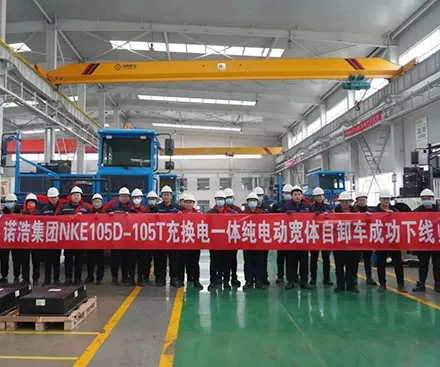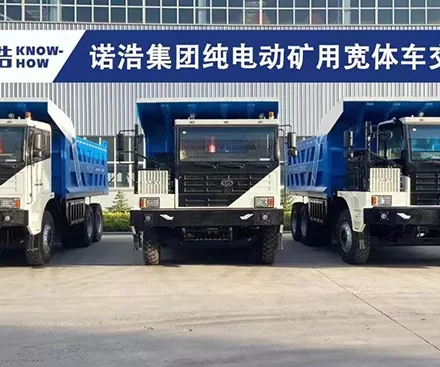The construction industry, known for its heavy machinery and resource-intensive operations, is experiencing a significant transformation with the introduction of electric excavators. These innovative machines, powered by electricity instead of traditional diesel engines, are making substantial waves by offering construction companies a cleaner, more efficient, and sustainable alternative. In this comprehensive exploration, we will delve into the various applications of electric excavators within the construction industry, their benefits, and the remarkable impact they are having on both project execution and environmental responsibility.
Electric excavators represent a crucial milestone in the ongoing evolution of the construction industry. Their emergence is driven by several key factors:
With a growing emphasis on sustainability, construction companies are under increasing pressure to reduce their carbon footprint and minimize environmental impact. Electric excavators, with zero tailpipe emissions, align perfectly with these goals.
Governments and regulatory bodies worldwide are imposing strict emissions regulations, motivating construction companies to explore cleaner alternatives. Electric excavators offer a compliant solution by eliminating harmful exhaust emissions.
Electricity is generally more cost-effective than diesel fuel. Electric excavators present construction companies with the opportunity to reduce their operating costs, a significant factor in the industry's competitiveness.
Electric excavators operate more quietly than their diesel counterparts. This reduction in noise pollution is highly beneficial, especially in urban construction projects where noise restrictions are in place.
Compared to diesel engines, electric excavators have fewer moving parts, resulting in reduced maintenance requirements and less downtime. This translates into increased operational efficiency.
Many electric excavators incorporate regenerative braking systems that capture and store energy during deceleration. This stored energy can then be utilized to power various electric systems within the excavator, further enhancing its efficiency.
The adoption of electric excavators within the construction industry brings forth a multitude of benefits:
Electric excavators generate no emissions during operation, effectively reducing the construction industry's environmental impact. This aligns with global efforts to combat climate change and achieve sustainability goals.
Despite potentially higher upfront costs, electric excavators often result in long-term cost savings due to lower operating expenses. Reduced fuel and maintenance costs make them a financially attractive option.
Electric excavators offer precise control over digging, lifting, and other operations, enhancing overall efficiency on construction sites. Operators can adjust power levels to match specific tasks, optimizing performance.
The quieter operation of electric excavators leads to improved working conditions on construction sites, reducing noise-related stress and potential hearing damage for workers. It also helps maintain positive relationships with nearby communities.
Electric excavators significantly reduce greenhouse gas emissions compared to diesel-powered models. This transition supports the construction industry in reducing its contribution to air pollution and climate change.
By using electric excavators, construction companies can easily meet stringent emissions regulations, reducing the risk of fines and penalties associated with non-compliance.
Electric excavators are versatile machines finding applications across various sectors of the construction industry:
In densely populated urban areas, where emissions and noise restrictions are common, electric excavators are becoming the preferred choice for construction projects. They offer efficient digging and material handling capabilities while minimizing disruption to residents and businesses.
Electric excavators are ideal for indoor construction projects, including building renovations. In such environments, where air quality and noise levels must be closely monitored and controlled, electric excavators thrive.
Electric excavators excel in trenching and excavation tasks. Their precise digging capabilities, combined with environmental benefits, make them valuable assets for these critical operations.
For tasks like grading, digging foundations, and moving earth in landscaping and earthmoving applications, electric excavators offer the power, precision, and environmental friendliness required.
Electric excavators are increasingly being employed for utility work, such as laying pipes and cables. Their precision and low emissions make them well-suited for these critical infrastructure tasks.
While electric excavators offer numerous advantages, there are also challenges and considerations that construction companies must address:
Construction sites need to have adequate charging infrastructure in place to keep electric excavators powered throughout the workday. This includes access to reliable electrical sources and charging stations.
Electric excavators may have a higher upfront cost compared to diesel-powered excavators models. Construction companies must evaluate their budget constraints and long-term cost savings when making purchasing decisions.
Hydraulic Electric excavators may have limited operating ranges compared to their diesel counterparts. Construction companies must carefully plan and manage their equipment's use to ensure it aligns with the scope of their projects.
The batteries required for electric excavators can add weight and size to the equipment. While this is generally not a concern for many applications, it may impact mobility and maneuverability in certain situations.
Electric excavators hold immense promise for the construction industry's future. As technology continues to advance, we can expect improvements in battery capacity, charging infrastructure, and overall efficiency. Furthermore, increased adoption of electric excavators will likely drive down their initial costs, making them a more accessible option for construction companies of all sizes.
In conclusion, electric excavators are not just a fleeting trend; they are a vital component of the construction industry's sustainable future. These innovative machines are changing the way construction projects are executed, making them quieter, cleaner, and more efficient while significantly reducing their environmental impact. As construction companies increasingly embrace electric excavators, we can anticipate a positive transformation in the industry's environmental responsibility and operational efficiency.
If you want to know more information about Electric excavators, please click on the image below to get a free quote:

Jul. 23, 2022
View More
Jun. 15, 2022
View More
Jun. 01, 2022
View More